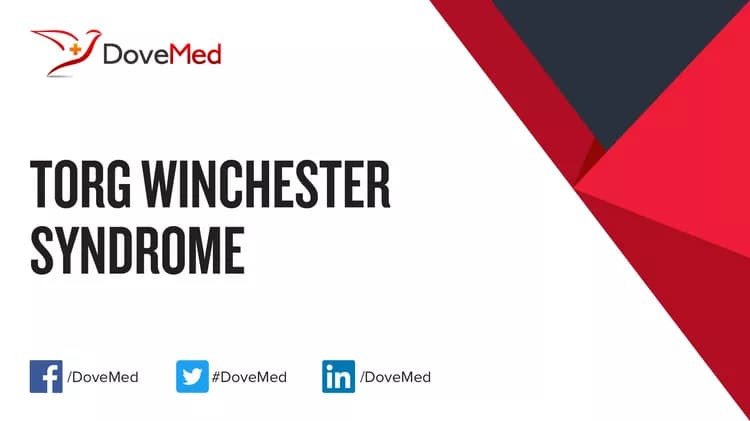What are the other Names for this Condition? (Also known as/Synonyms)
- Hereditary Multicentric Osteolysis
- Multicentric Osteolysis-Nodulosis-Arthropathy Spectrum
- Nodulosis Arthropathy Osteolysis Syndrome
What is Torg Winchester Syndrome? (Definition/Background Information)
- Torg Winchester Syndrome, also known as Multicentric Osteolysis-Nodulosis-Arthropathy (MONA) Spectrum, is a rare genetic chronic skeletal disorder
- It is characterized by peripheral osteolysis (especially carpal and tarsal bones), interphalangeal joint erosions, subcutaneous fibrocollagenous nodules, facial dysmorphism, and a wide range of associated manifestations
- Less than 50 cases of Torg Winchester Syndrome have been reported worldwide
- The syndrome is caused by mutation(s) in MMP2 and MMP14 genes, and inherited in an autosomal recessive manner
- Although life expectancy is not affected, many affected individuals are wheelchair bound, due to progressive joint destruction
(Source: Multicentric Osteolysis-Nodulosis-Arthropathy Spectrum; Orphanet, National Institute of Health and Medical Research (INSERM), Paris.)
Who gets Torg Winchester Syndrome? (Age and Sex Distribution)
- Torg Winchester Syndrome is a rare congenital disorder. The presentation of symptoms may begin in infancy or childhood
- Both males and females may be affected
- Worldwide, individuals of all racial and ethnic groups may be affected
What are the Risk Factors for Torg Winchester Syndrome? (Predisposing Factors)
- A positive family history may be an important risk factor, since Torg Winchester Syndrome can be inherited
- Currently, no other risk factors have been clearly identified for the syndrome
It is important to note that having a risk factor does not mean that one will get the condition. A risk factor increases one’s chances of getting a condition compared to an individual without the risk factors. Some risk factors are more important than others.
Also, not having a risk factor does not mean that an individual will not get the condition. It is always important to discuss the effect of risk factors with your healthcare provider.
What are the Causes of Torg Winchester Syndrome? (Etiology)
- Torg Winchester Syndrome is caused by mutation(s) in MMP2 or MMP14 genes. These genes code for matrix metalloproteinase enzymes
- The syndrome is inherited in an autosomal recessive manner
(Source: Multicentric osteolysis-nodulosis-arthropathy spectrum; Orphanet, National Institute of Health and Medical Research (INSERM), Paris.)
Autosomal recessive mode of inheritance: Autosomal recessive conditions are traits or disorders that occur when two copies of an abnormal gene have been inherited on a non-sex chromosome. If both parents have an autosomal recessive condition, there is a 100% likelihood of passing on the mutated genes to their children. If, however, only one mutant copy of the gene is inherited, the individual will be a carrier of the condition, but will not be present with any symptoms. Children born to two carriers, have a 25% chance of being homozygous dominant (unaffected), a 50% chance of being heterozygous (carrier), and a 25% chance of being homozygous recessive (affected).
What are the Signs and Symptoms of Torg Winchester Syndrome?
The signs and symptoms of Torg Winchester Syndrome may include:
- Arthropathy
- Coarse facial features
- Corneal opacity
- Generalized osteoporosis
- Gingival overgrowth
- Osteolysis involving bones of the feet
- Osteolysis involving bones of the upper limbs
(Source: Torg Winchester Syndrome; Genetic and Rare Diseases Information Center (GARD) of National Center for Advancing Translational Sciences (NCATS), USA.)
How is Torg Winchester Syndrome Diagnosed?
Torg Winchester Syndrome is diagnosed on the basis of the following information:
- Complete physical examination
- Thorough medical history evaluation
- Assessment of signs and symptoms
- Laboratory tests
- Imaging studies
- Biopsy studies, if necessary
- Molecular genetic testing to check for or confirm MMP2 or MMP14 gene mutations
Many clinical conditions may have similar signs and symptoms. Your healthcare provider may perform additional tests to rule out other clinical conditions to arrive at a definitive diagnosis.
What are the possible Complications of Torg Winchester Syndrome?
The complications of Torg Winchester Syndrome may include:
- Difficulty with movement
- Decreased quality of life owing to progressive deterioration of joints
- Necessity for wheelchair for movement
Complications may occur with or without treatment, and in some cases, due to treatment also.
How is Torg Winchester Syndrome Treated?
There is no cure for Torg Winchester Syndrome, since it is a genetic condition. The treatment is usually given to manage the signs and symptoms and any complication that develops.
How can Torg Winchester Syndrome be Prevented?
Torg Winchester Syndrome may not be preventable, since it is a genetic disorder.
- Genetic testing of the expecting parents (and related family members) and prenatal diagnosis (molecular testing of the fetus during pregnancy) may help in understanding the risks better during pregnancy
- If there is a family history of the condition, then genetic counseling will help assess risks, before planning for a child
- Active research is currently being performed to explore the possibilities for treatment and prevention of inherited and acquired genetic disorders
- Regular medical screening at periodic intervals with tests and physical examinations are recommended
What is the Prognosis of Torg Winchester Syndrome? (Outcomes/Resolutions)
- The prognosis of Torg Winchester Syndrome is dependent upon the severity of the signs and symptoms and associated complications, if any. However, the syndrome does not shorten one’s life expectancy
- Since, it is a progressive condition that causes destruction of the joints, most individuals require assistive devices or even wheelchairs to move around
Additional and Relevant Useful Information for Torg Winchester Syndrome:
Torg Winchester Syndrome is also known by the following additional names:
- Al-Qeel Sewairi Syndrome
- MONA Spectrum
- NOA Syndrome
- Torg Syndrome
- Winchester Syndrome
- Winchester-Grossman Syndrome
The following DoveMed website link is a useful resource for additional information:
Related Articles
Test Your Knowledge
Asked by users
Related Centers
Related Specialties
Related Physicians
Related Procedures
Related Resources
Join DoveHubs
and connect with fellow professionals


0 Comments
Please log in to post a comment.